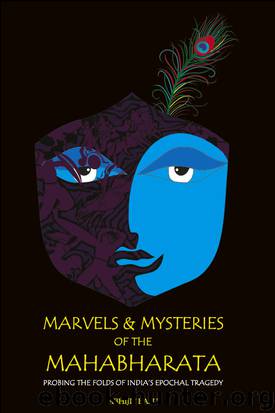Marvels & Mysteries of the Mahabharata by Abhijit Basu

Author:Abhijit Basu [Basu, Abhijit]
Language: eng
Format: epub
ISBN: 9789381836781
Publisher: Leadstart Publishing Pvt Ltd
Then again, what Vidura says to the blind king after the war is only of a piece with the words of detachment with which Krshna counselled a despondent Arjuna just before it:
Gataasoon-agataasoomsh-ca naanushocanti panditaah //
~ Gita; 2.11
Those who are wise lament neither for the dead nor for the living.5.11
But have we not already heard similar wisdom of detachment, as the leitmotif of the Mahabharata’s hair-raising cosmic quietism, even before the hurly burly of war, from the lips of the forester Yudhishthira, in his reply to the crane guard:
Asmin mahaa-mohamaye kataahe
Suryaa-gninaa raatridin-endhanena /
Maas-ortu-darvee parighattanena
Bhootaani kaalah pacateeti vaartaa //
~ Vana; 313.118
In this cauldron of great illusion, with the sun as fire, day-night as fuel; using months and seasons as stirrer, Time is cooking all beings – that is the message.
That, indeed, is the marvel of the Mahabharata message.
NOTES & REFERENCES
5.1 The numbers of verses correspond to the traditional Aryashastra edition.
5.2 The episode of the curse by the blind sage appears as a flashback in the Ayodhya-kaanda (63-64), with Dasharatha relating the incident to Kaushalya, before dying of grief at Rama’s banishment.
5.3 Karna alone can perhaps claim the distinction of being the Mahabharata’s one great epitome of purushakaara. A self-made hero in every sense, his entire life – a saga of heroic effort despite being disowned at birth, being humiliated at every effort of self-actualisation, being deprived of his invincible armour through his own generosity, being exploited by a dissembling Indra, and being afflicted by two great curses (brought about by his own acts of commission and omission) – is one long battle against adversities caused by cruel destiny.
5.4 The subsequent narration of events of the Maushala-parva is based largely on the Bengali Mahabharat-Saranuvad, by Rajshekhar Basu, M.C. Sarkar & Sons, Kolkata-73, 1949 (Bengali Calendar: 1356), Tenth Reprint: 1987, and the English translation of The Mahabharata (Book 16)’, by Kisari Mohan Ganguli, Internet Sacred Text Archive, 1883-1896, (to be found at: http://www.sacred-texts.com/hin/m16/index.htm).
5.5 There is also a non-sexual Christian view of the sin of Sodom, which gives a variant interpretation of the word ‘know’ in this verse of the Genesis: And they called unto Lot, and said unto him, Where [are] the men which came in to thee this night? Bring them out unto us, that we may know them.[Gen 19:5, Holy Bible, King James Version]. Whereas orthodox Christian opinion holds that Lot’s brother citizens were making a militant solicitation for homosexual sex, others interpret the demand to ‘know’ as demanding the right to interrogate the strangers. However, the majority orthodox view of a sexual connotation seems to be borne out by the following appeal of Lot, found only three verses later in the same narrative: Behold now, I have two daughters which have not known man; let me, I pray you, bring them out unto you, and do ye to them as is good in your eyes: only unto these men do nothing.... [Gen 19:8]. In contrast, there is no reason to doubt that Yadava promiscuity was anything other than of a hetero-sexual nature.
Download
This site does not store any files on its server. We only index and link to content provided by other sites. Please contact the content providers to delete copyright contents if any and email us, we'll remove relevant links or contents immediately.
In Control (The City Series) by Crystal Serowka(35789)
The Wolf Sea (The Oathsworn Series, Book 2) by Low Robert(34700)
We Ride Upon Sticks by Quan Barry(34002)
Crowbone (The Oathsworn Series, Book 5) by Low Robert(33054)
The Book of Dreams (Saxon Series) by Severin Tim(32914)
The Daughters of Foxcote Manor by Eve Chase(23053)
Trainspotting by Irvine Welsh(21025)
Call Me by Your Name by André Aciman(19903)
Shot Through The Heart (Supernature Book 1) by Edwin James(18428)
The Secret History by Donna Tartt(18163)
The Girl from the Opera House by Nancy Carson(15382)
American King (New Camelot #3) by Sierra Simone(14869)
All the Missing Girls by Megan Miranda(14737)
Sad Girls by Lang Leav(13909)
Pimp by Iceberg Slim(13779)
The Betrayed by Graham Heather(12301)
The Betrayed by David Hosp(12204)
4 3 2 1: A Novel by Paul Auster(11792)
Still Me by Jojo Moyes(10787)
